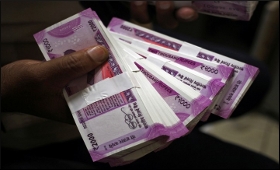|

|
Govt projects decrease in revenue expenditure to 85 pc in 2019-20
|
|

|
|
| Top Stories |
 |
|
|
|
SME Times News Bureau | 11 Aug, 2017
The proportion of revenue expenditure in the total expenditure which is budgeted to be 85.6 percent in the current fiscal, is projected to be roughly the same in 2018-19 and decrease to 85 percent in 2019-20, according to the Medium-Term Expenditure Framework (MTEF) Statement tabled in the Lok Sabha on Thursday.
The Medium-term Expenditure Framework Statement is a statement presented to the Parliament under Section 3 of the Fiscal Responsibility and Budget Management (FRBM) Act, 2003 and sets forth a three-year rolling target for the expenditure indicators with specification of underlying assumptions and risks involved.
The major components of revenue expenditure include salaries, pension, expenditure on Defence, interest payments and subsidies.
During the course of the current financial year, it is expected that the increase in House Rent Allowance (HRA) that was recommended by the 7th Pay Commission will lead to an additional expenditure on salaries to the tune of Rs 11,500 crore for the remaining eight months of the financial year which will be required to be provided at Revised Estimates stage.
Salary projections in absolute terms is kept to Rs 1,38,122 crore in 2018-19 and Rs 1,49,457 crore in 2019-20.
The assumptions with regard to pension has been that the pension commitments will increase by about 10 percent in 2018-19 and 8 percent in 2019-20 over previous year's estimates/projections. From the base year pension amount of Rs 1,31,201 crore in 2017-18, MTEF projections for pension has been kept at Rs 1,44,321 crore and Rs 1,55,867 crore in 2018-19 and 2019-20 respectively.
Interest payments constitute the largest component of Centre's revenue expenditure. In Budget Estimate of 2017-18, interest payments have been estimated at Rs 5,23,078 crore, constituting 24 percent of the total expenditure of the central government. As a percentage of gross tax revenue this constituted 27 percent.
With the primary deficit budgeted at Rs 23,454 crore (0.1 percent of GDP), the interest payments nearly equal the fiscal deficit of the country. Interest payments work out to 3.1 percent of GDP. This is partly reflective of the declining trajectory of the fiscal deficit.
Though interest payments were budgeted to be Rs 4,92,670 crore in 2016-17, the provisional actuals for interest payments in 2016-17 worked out to Rs 4,80,519 crore. This fall of interest payments by more than Rs 12,000 crore is indicative of the economy moving towards a more benign interest rate cycle, it said.
"If this trend continues, it will have an impact not only on the government expenditure but also will have a salutary impact on the investment decisions of economic agents in the country," it noted.
The MTEF projections for the nominal interest payments for the years 2018-19 and 2019-20 have been pegged at Rs 5,64,400 crore and Rs 6,15,000 crore. The projections for the nominal interest payments for the years 2018-19 and 2019-20 have been pegged at Rs 5,64,400 crore and Rs 6,15,000 crore.
The statement provides an estimate of expenditure commitments for various items - education, health, rural development, energy, subsidies and pension.
The objective of the MTEF is to provide a closer integration between budget and the FRBM statements. The MTEF Statement is presented separately in the session next to the session in which Union Budget is presented, i.e. normally in the Monsoon Session.
The first Medium Term Expenditure Framework was laid in the Monsoon Session of Parliament in August 2013.
The Fiscal Responsibility and Budget Management (FRBM) Act, 2003 was enacted with a view to provide a legislative framework for reduction of deficit, and thereby debt, of the government to sustainable levels over a medium term so as to ensure inter-generational equity in fiscal management and long term macro-economic stability.
FRBM Act required the government to lay before the Parliament three policy statements in each financial year namely, Medium Term Fiscal Policy Statement, Fiscal Policy Strategy Statement and Macroeconomic Framework Policy Statement.
|
|
|
| |
|
|
|
|
|
|
|
|
|
|
|
|
|
|
| |
| Customs Exchange Rates |
| Currency |
Import |
Export |
US Dollar
|
66.20
|
64.50 |
UK Pound
|
87.50
|
84.65 |
Euro
|
78.25
|
75.65 |
| Japanese
Yen |
58.85 |
56.85 |
| As on 13 Aug, 2022 |
|
|
| Daily Poll |
 |
 |
| PM Modi's recent US visit to redefine India-US bilateral relations |
|
|
|
|
|
| Commented Stories |
 |
|
|
|
|
|
| |
|